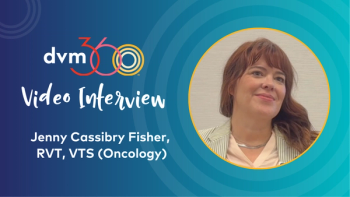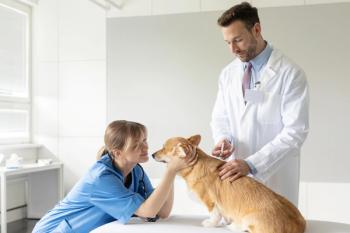
The benefits of becoming a diplomate
Looking to get more out of your veterinary practice experience? I know I once dreamed of becoming board certified in surgery, internal medicine, or another specialty. But somehow my plans changed when I entered the real world. Happily, I learned that the American Board of Veterinary Practitioners (ABVP) rewards committed practitioners who wish to attain a new level of patient care and professional satisfaction by giving them an avenue to attain board certification that doesn't involve the traditional residency programs.
By Fred Metzger, DVM, Dipl. ABVP
Looking to get more out of your veterinary practice experience? I know I once dreamed of becoming board certified in surgery, internal medicine, or another specialty. But somehow my plans changed when I entered the real world. Happily, I learned that the American Board of Veterinary Practitioners (ABVP) rewards committed practitioners who wish to attain a new level of patient care and professional satisfaction by giving them an avenue to attain board certification that doesnt involve the traditional residency programs.
By gaining accreditation from the ABVP, I expanded my skills and reenergized my love of practicing veterinary medicine. And I think becoming a diplomate could work for you, too.
Most diplomates I know pursue certification to really focus on their professional development and to improve their diagnostic skills and knowledge of advanced treatment techniques. The ABVP is one of 20 specialty boards the AVMA recognizes (and the only one requiring recertification every 10 years). Accredited in 1978, it was the first specialty board to recognize clinical practitioners with species specialization.
The ABVP promotes the highest standards of veterinary practice by recognizing veterinarians, qualified through exams, who deliver superior comprehensive veterinary care. And achieving certification demonstrates your dedication and commitment to advancing your craft beyond your veterinary school diploma.
Veterinarians attempt the rigorous certification and recertification process for many reasons. Many ABVP diplomates choose to create or merge with specialty and referral practices, increasing the number of second opinion and referral cases they see. And veterinary companies and universities often employ or consult with ABVP diplomates because of the knowledge those doctors gained through their specialized study and daily practice life. The key benefit for me: Simply put, Im a better veterinarian because of having experienced the ABVP process.
ABVP and me
After graduating from Purdue University in 1986 I intended to pursue a clinical pathology residency with one of my mentors, Dr. Alan Rebar, but I was bitten by the practice bug and returned home to Pennsylvania. After six years in practice, I wanted to take my medical skills to the next level, and ABVP certification seemed like the logical step.
My biggest challenge: the time commitment. It took me a solid year to write the two required articles, and I spent another six months studying intensely for the exam. I read Ettingers two-volume Textbook of Veterinary Internal Medicine, Bojrabs Current Techniques in Small Animal Surgery, Gelatts Essentials of Veterinary Ophthalmology, Guytons Textbook of Medical Physiology, and Millers Anatomy of the Dogall twice! Last year for recertification, I read Ettingers Internal Medicine again, as well as The 5-Minute Veterinary Consult: Canine and Feline and Saunders Manual of Small Animal Practiceyep, twice. Did this make me a better veterinarian? Absolutely! And now I have the privilege of lecturing and writing articles with my mentors Drs. Rebar and Dennis DeNicola.
The nitty-gritty details
Attaining ABVP Diplomate status requires a serious time commitment. ABVP requires new applicants to:
Complete an approved residency program or six years of approved clinical practice.
Submit a curriculum vitae and synopsis of veterinary practice. Basically, youll summarize the medical and surgical procedures youve performed.
Obtain and document at least 90 hours of continuing education during the previous five years.
Attain three letters of reference, with at least one coming from a board-certified veterinarian.
Submit two clinical articles that demonstrate your advanced knowledge for the ABVP credentialing committee to review.
If the committee approves your application, you must pass an extensive two-day exam consisting of a two-part specialty exam and a practical exam. But wait, theres more!
Diplomates must recertify every 10 years to maintain diplomate status by passing the ABVP specialty exam. Rigorous and time consuming? Yes. Challenging? Definitely. But, most important, a fulfilling and worthwhile process for meand other practicing veterinariansto give our patients optimum care.
Newsletter
From exam room tips to practice management insights, get trusted veterinary news delivered straight to your inbox—subscribe to dvm360.





